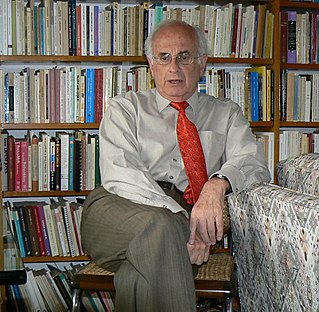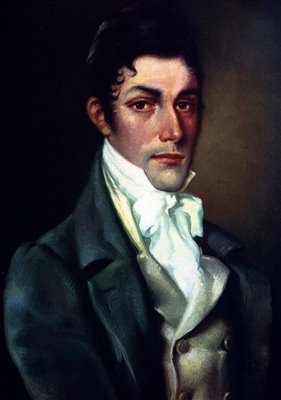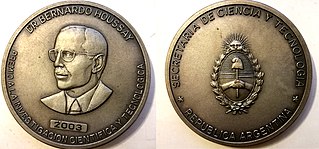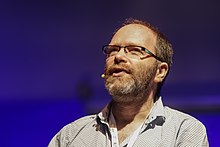The First Triumvirate was the executive body of government that replaced the Junta Grande in the United Provinces of the Río de la Plata. It started its functions on September 23, 1811, and was replaced on October 8, 1812.

The United Provinces of the Río de la Plata, earlier known as the United Provinces of South America, was a name adopted in 1816 by the Congress of Tucumán for the region of South America that declared independence in 1816, with the Sovereign Congress taking place in 1813, during the Argentine War of Independence (1810–1818) that began with the May Revolution in 1810. It originally comprised rebellious territories of the former Spanish Viceroyalty of the Río de la Plata dependencies and had Buenos Aires as its capital.
The Second Triumvirate was the governing body of the United Provinces of the Río de la Plata that followed the First Triumvirate in 1812, shortly after the May Revolution, and lasted 2 years.

Néstor Alberto Braunstein was an Argentine-Mexican physician, psychiatrist and psychoanalyst.

The Mutiny of Álzaga was an ill-fated attempt to remove Santiago de Liniers as viceroy of the Viceroyalty of the Río de la Plata. It took place on January 1, 1809, and it was led by the merchant Martín de Álzaga. The troops of Cornelio Saavedra, head of the Regiment of Patricians, defeated it and kept Liniers in power.

Ricardo Forster is an Argentine philosopher, historian of ideas and political critic.
Oscar Terán was an Argentinean philosopher.

Miguel Gerónimo de Esparza (1678–1767) was a Spanish nobleman, who served during the Viceroyalty of Peru as Attorney and Regidor of Buenos Aires. He also served as Captain of the Militias and acting Mayor of Buenos Aires for several periods.
Omar Acha is an Argentine historian and political essayist. He is a researcher at the Consejo Nacional de Investigaciones Científicas y Técnicas and also at the Centro de Investigaciones Filosóficas (Argentina). He teaches Philosophy of History at the Universidad de Buenos Aires. He was also a member of the editorial board of Herramienta. Revista de Teoría y Crítica Marxista, published in Buenos Aires.

Estudios San Miguel was an Argentine film studio that was active in the 1940s and early 1950s. It flourished during the golden age of Cinema of Argentina, and at its peak was one of the major studios in Buenos Aires. Genres ranged from musical comedy to costume drama and gaucho thriller. Films included La guerra gaucha, co-produced with Artistas Argentinos Asociados, and the comedy Juvenilia (1943), both of which won several major awards. Eva Duarte, soon to become the first lady of Argentina as Eva Perón, appeared in two of the studio's films in 1945. The studio became overextended financially and ceased production after 1952.
Margarita Elena Chiozza was an Argentinian geographer. She graduated in history from the Faculty of Arts at the University of Buenos Aires.

Laura Malosetti Costa is a Uruguayan-born Argentine social and cultural anthropologist, researcher, art historian, and essayist. She is also a curator of art exhibitions and the author of several books on Latin American art. She was recognized with the Konex Award in 2006 and 2016.

Dora Beatriz Barrancos is an Argentine researcher, sociologist, historian, feminist, and politician.

The Bernardo Houssay Award is a distinction awarded by Argentina's Ministry of Science, Technology and Productive Innovation to honor outstanding work by scientists and researchers. The Ministry selects recipients annually through a jury of prominent scientists. Presented by the President of Argentina, it is one of the country's most prestigious prizes in the field of science and engineering.

María Antonia Ruth Sautu is an Argentine sociologist and methodologist.
Ladislao Pablo Győri is an Argentine engineer, digital and visual artist, essayist and poet, most known as the creator of Virtual Poetry in 1995, which has been described as "of utmost significance in advancing literature as sculptural object in electronic space". He has been described as one of the rare "poet-practitioners dedicated to 3-D art".
Olimpia Iris Lombardi is an Argentine philosopher of science whose research involves ontology in chemistry and in quantum mechanics, including the use of ontological pluralism to argue for treating chemistry as autonomous from, rather than subsidiary to, physics.

Mirta Zaida Lobato is an Argentine historian, essayist, and full professor specializing in the social, cultural and political history of the world of work and gender relations in Argentina and Latin America in the 20th century. Lobato was the founder of "Área Interdisciplinaria de Estudios de la Mujer" (AIEM). She was awarded a Guggenheim Fellowship in 2006.

José Luis Cantilo was an Argentine diplomat and politician of the Radical Civic Union. He served both as intendente (mayor) of the City of Buenos Aires and as governor of Buenos Aires Province during the 1920s. From 1936 to 1941, he also served as a National Deputy and as President of the Chamber of Deputies.

The Faculty of Medical Sciences, formerly and commonly known as the Faculty of Medicine, is the medical school of the University of Buenos Aires (UBA), the largest university in Argentina. Established in 1822 as one of the UBA's earliest divisions, FMED is presently the largest medical school in Argentina, with over 24,000 enrolled students as of 2011.













